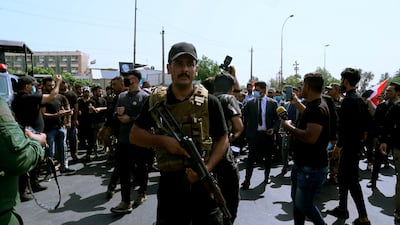The US Treasury on Friday issued new sanctions against Iran-backed militia groups operating in Iraq amid a surge in attacks on American and coalition forces in the region.
The sanctions name seven people and include groups such as Kataib Hezbollah, a major Iran-aligned Iraqi militia groups that has been designated a Foreign Terrorist Organisation by the US.
The designations come during a near-daily surge in attacks on US troops and coalition forces in Iraq and Syria, with Washington pointing the finger at Iran-backed militias for many attempted strikes.
US and coalition troops have been attacked 62 times since October 17, with 29 in Iraq and 33 in Syria, a defence official confirmed to The National.
These have included a “one-way drone attack” this week at a mission support site in Euphrates, Syria; three separate attacks in Bashur, Iraq; and several attacks at Al Asad Airbase in Iraq and Tall Baydar, Syria.
The attacks have injured 59 personnel, though all have returned to duty. Strikes have mainly hit unoccupied facilities, including weaponry storage sites.
On the recent strike at Tall Baydar this week, the defence official said one US servicemember had sustained “minor injuries” and added that the US was “still awaiting further details on soldier's injuries”.
Explained: The US-Iran rivalry in eastern Syria
Washington has engaged in counterstrikes in Syria, with US officials this week saying they believe the latest air strikes on Sunday against Iran-linked militia in the country killed up to seven people, according to Reuters, which cited an unnamed administration official.
The attacks began 10 days after Israel started its bombardment of the Gaza Strip in response to the Hamas attack on southern Israel.
The US has repeatedly warned proxy groups and Iran that it will not tolerate attempts to broaden the war into a regional conflict.
The Biden administration on Friday also responded to criticism over its decision to renew a sanctions waiver on Iranian electricity sales to Iraq.
Republican congressmen Blaine Luetkemeyer, chairman of the Subcommittee on National Security, Illicit Finance, and International Financial Institutions, and Bill Huizenga, chairman of the Subcommittee on Oversight and Investigations, called the waiver extension “naive and ill-timed”.
“The decision rewards and emboldens Iran at a time when its hostile government continues to financially support terrorist groups including Hamas,” the congressmen said in a statement.
But White House National Security Council spokeswoman Adrienne Watson pointed out that this was the 21st time Washington had approved the waiver, “continuing a practice that began under the [former president Donald] Trump administration”.
She added that the move “does not represent any changes in our policy regarding Iran or Iraq”.
“This waiver ensures the Iraqi people will not suddenly lose access to electricity or face an unnecessary spike in electricity prices. Iraq is making significant progress towards energy independence with our encouragement. But that takes time,” Ms Watson said on X, the platform formerly known as Twitter.


